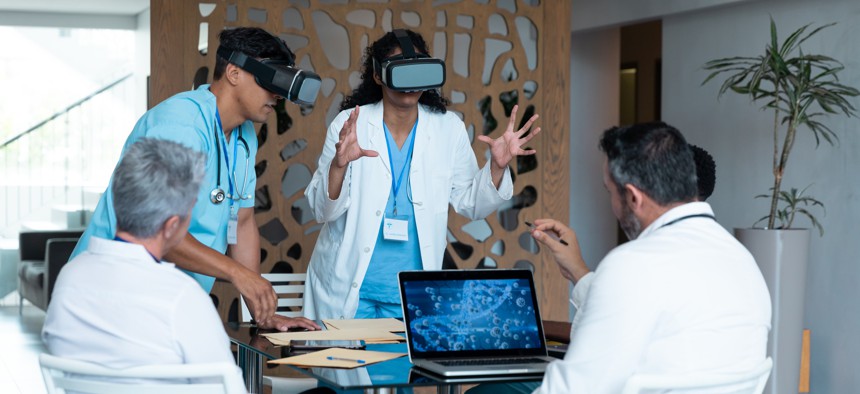State expands life sciences, emerging tech clout with research institute

Wavebreakmedia/Getty Images
A new medical research hub in Maryland will use artificial intelligence, virtual reality and other emerging technologies to improve health care training, treatment and research.
Maryland is expanding its life sciences and technology footprint with the launch of the University of Maryland 3-Institute for Health Computing (UM-3-IHC), a research and academic facility that will merge leading edge computing technologies with biomedical research.
Montgomery County Executive Director Marc Elrich signed a memorandum of understanding last week with the University of Maryland-College Park (UMCP), the University of Maryland-Baltimore (UMB) and the University of Maryland Medical System. The partners’ collective expertise will build UM-3-IHC into an “epicenter of computationally enabled biomedical research, population health, and precision medicine,” the MOU stated.
The institute will provide students with internships, experiential learning and jobs and will also spur the growth of life science and AI companies in the area. UM-3-IHC “will be on the leading edge of the growing marriage of computing—data visualization, machine learning and artificial intelligence—to biological research,” Elrich said in an announcement. “This convergence of computing and lab work will only grow as it promises to speed and broaden our ability to address health outcomes that will benefit Montgomery County and beyond.”
AI and machine-learning algorithms will be used to evaluate electronic health records to help identify trends in data that provide insight to emerging diseases and patient care. Tracking changes in outpatient lab tests, for example, will allow doctors to target the progression of poorly controlled diabetes or high blood pressure and allow targeted interventions, officials said.
UM-3-IHC will also use 5G wireless and virtual and augmented reality technologies to expand doctor’s diagnostic capabilities and make telehealth more accessible to patients, especially those in rural areas, officials said.
“This new research center will bring organizations from all over to Montgomery County to explore solutions to complex problems utilizing the latest technological advances in artificial intelligence, machine learning and virtual and augmented reality,” Montgomery County Council Vice President Evan Glass said. “Supporting our growing bio-tech industry, the center is poised to make Montgomery County a hub for providing state of the art health solutions across the metropolitan region.”
MPower, a collaboration between UMCP and UMB, is providing $25 million in initial funds, and Montgomery County will invest $40 million for site development. Sen. Chris Van Hollen (D-Md.) said federal funds will also help support the use of cutting-edge equipment at the facility.
The institute is slated to open in early 2023, and an official laboratory and office space will open in 2028 in Bethesda.






